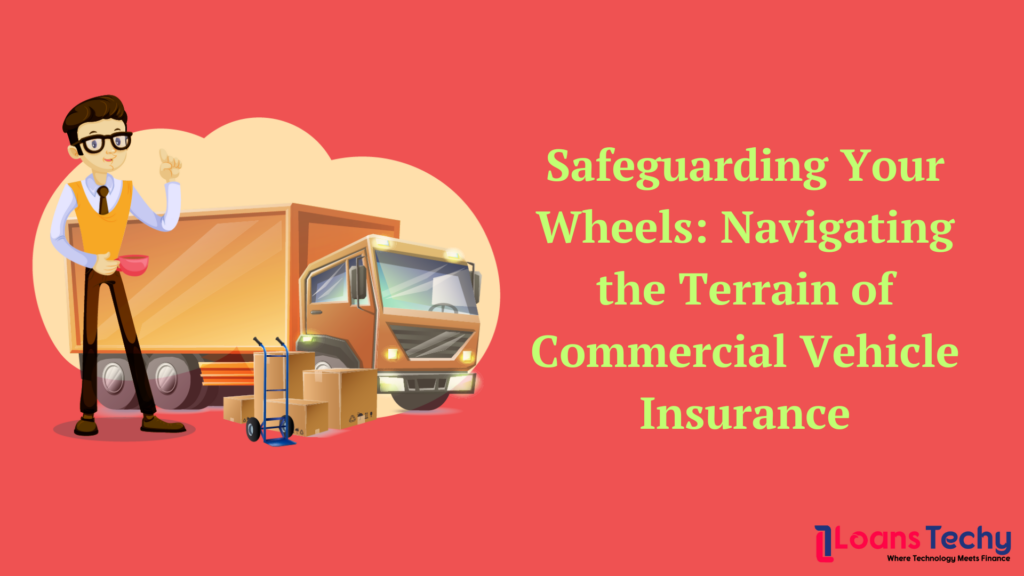In the fast-paced world of commerce, where logistics and efficiency reign supreme, commercial vehicles are the backbone of business operations. From delivery vans weaving through city streets to heavy-duty trucks transporting goods across continents, these vehicles are not just transportation assets but crucial components of business success. However, with great utility comes great responsibility—protecting these assets from potential risks and liabilities is paramount.

Commercial vehicle insurance serves as a critical safety net for businesses reliant on fleets of vehicles. Beyond mere protection against physical damage, it shields businesses from financial repercussions arising from accidents, thefts, and other unforeseen incidents. By providing tailored coverage options, it ensures that businesses can maintain operational continuity and financial stability in the face of adversity.
What is Commercial Vehicle Insurance?
Commercial vehicle insurance differs significantly from personal auto insurance in scope and purpose. While personal auto insurance typically covers vehicles used for personal purposes, commercial vehicle insurance is designed specifically for vehicles used primarily for business activities. This distinction acknowledges the unique risks faced by businesses operating fleets of vehicles and provides comprehensive coverage options to address those risks effectively.
Types of Commercial Vehicle Insurance Coverage
1. Liability Coverage
Liability coverage forms the foundation of commercial vehicle insurance, protecting businesses from financial liabilities resulting from accidents where their drivers are at fault. This coverage extends to bodily injury and property damage caused to third parties, encompassing medical expenses, legal fees, and settlement costs. For instance, if a delivery truck collides with another vehicle, causing injuries and property damage, liability coverage steps in to cover these expenses, shielding the business from potentially devastating financial consequences.
2. Collision Coverage
Accidents are an unfortunate reality of road travel, even for the most cautious drivers. Collision coverage provides financial protection for commercial vehicles involved in collisions, irrespective of fault. Whether it’s a minor incident in a parking lot or a major collision on the highway, this coverage ensures that the costs of repairing or replacing your vehicle are covered, minimizing disruptions to your business operations and financial stability.
3. Comprehensive Coverage
Beyond collisions, commercial vehicles face a myriad of risks in their daily operations. Comprehensive coverage offers protection against non-collision incidents such as theft, vandalism, fire, natural disasters, and more. Imagine waking up to find your delivery van stolen or damaged by a severe storm—comprehensive coverage provides the financial security needed to swiftly repair or replace your vehicle, allowing your business to resume operations without prolonged interruptions.
4. Uninsured/Underinsured Motorist Coverage
Despite legal requirements, not all drivers carry adequate insurance coverage. Uninsured/underinsured motorist coverage safeguards businesses from financial losses resulting from accidents with drivers who lack insurance or carry insufficient coverage. Whether your vehicle is involved in a hit-and-run or collides with an uninsured motorist, this coverage ensures that your business isn’t left to bear the full financial burden, preserving your financial stability and operational continuity.
Also Read:
FAQs About Commercial Vehicle Insurance
Q: Do I really need commercial vehicle insurance if I have personal auto insurance?
A: Yes, commercial vehicle insurance is essential if your vehicles are primarily used for business purposes. Personal auto insurance typically excludes coverage for vehicles used commercially, leaving significant gaps in protection that could expose your business to substantial financial risks in the event of an accident or other incidents.
Q: How can I lower my commercial vehicle insurance premiums?
A: Lowering commercial vehicle insurance premiums requires a strategic approach focused on risk management and demonstrating proactive safety measures:
Safety Features: Equip vehicles with advanced safety technologies such as anti-lock brakes, airbags, and collision avoidance systems to reduce the likelihood of accidents and qualify for insurance discounts.
Driver Training: Implement comprehensive driver training programs to promote safe driving habits among employees. Many insurers offer premium discounts to businesses that invest in driver education and certification programs.
Higher Deductibles: Opt for higher deductibles to lower insurance premiums, although this approach increases out-of-pocket expenses in the event of a claim.
Fleet Management: Maintain detailed records of vehicle maintenance and usage to demonstrate responsible fleet management practices, which can lead to lower insurance premiums.
Comparison Shopping: Compare quotes from multiple insurance providers to find the coverage options and premium rates that best meet your business needs and budget.
Q: Are there specific types of vehicles that need commercial insurance?
A: Yes, commercial vehicle insurance is typically required for vehicles used primarily for business purposes, including delivery trucks, box trucks, service vans, taxis, construction vehicles, and specialty vehicles. These vehicles require specialized insurance coverage to protect against the unique risks associated with their respective industries and operations.
Conclusion: Steering Towards Safety
Commercial vehicle insurance is not just a regulatory requirement—it is a crucial investment in the resilience and longevity of your business. By proactively managing risks and securing comprehensive insurance coverage, businesses can mitigate potential financial losses, maintain operational continuity, and safeguard their assets and employees. Whether you operate a small business with a modest fleet or manage a large-scale logistics operation, prioritizing commercial vehicle insurance ensures that your business remains secure and sustainable in an ever-evolving business environment.
This article provides a detailed exploration of commercial vehicle insurance, covering its importance, coverage types, practical considerations, and strategies for optimizing insurance premiums, all presented in a structured and engaging format using Markdown.